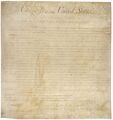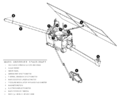Template:Selected anniversaries/September 25: Difference between revisions
No edit summary |
No edit summary |
||
| Line 3: | Line 3: | ||
File:Ole Rømer.jpg|link=Ole Rømer (nonfiction)|1644: Astronomer and instrument maker [[Ole Rømer (nonfiction)|Ole Rømer]] born. He will make the first quantitative measurements of the speed of light. | File:Ole Rømer.jpg|link=Ole Rømer (nonfiction)|1644: Astronomer and instrument maker [[Ole Rømer (nonfiction)|Ole Rømer]] born. He will make the first quantitative measurements of the speed of light. | ||
||1777: Johann Heinrich Lambert dies . | File:Johann Heinrich Lambert.jpg|link=Johann Heinrich Lambert (nonfiction)|1777: Polymath [[Johann Heinrich Lambert (nonfiction)|Johann Heinrich Lambert]] dies. He made important contributions to mathematics, physics (particularly optics), philosophy, astronomy, and map projections. | ||
File:Bill of Rights.jpg|link=United States Bill of Rights (nonfiction)|1789: The United States Congress passes twelve amendments to the United States Constitution: The Congressional Apportionment Amendment (which was never ratified), the Congressional Compensation Amendment, and the ten that are known as the [[United States Bill of Rights (nonfiction)|Bill of Rights]]. | File:Bill of Rights.jpg|link=United States Bill of Rights (nonfiction)|1789: The United States Congress passes twelve amendments to the United States Constitution: The Congressional Apportionment Amendment (which was never ratified), the Congressional Compensation Amendment, and the ten that are known as the [[United States Bill of Rights (nonfiction)|Bill of Rights]]. | ||
Revision as of 16:23, 25 September 2018
1644: Astronomer and instrument maker Ole Rømer born. He will make the first quantitative measurements of the speed of light.
1777: Polymath Johann Heinrich Lambert dies. He made important contributions to mathematics, physics (particularly optics), philosophy, astronomy, and map projections.
1789: The United States Congress passes twelve amendments to the United States Constitution: The Congressional Apportionment Amendment (which was never ratified), the Congressional Compensation Amendment, and the ten that are known as the Bill of Rights.
1819: Mathematician and Anglican theologian George Salmon born. He will work in algebraic geometry for two decades, then devote the last forty years of his life to theology.
1845: Judge Havelock With Glass is "a reasonably accurate depiction of events as I experienced them," according to the Judge.
1893: Mathematician and statistician Harald Cramér born. He will help found probability theory as a branch of mathematics, writing in 1926: "The probability concept should be introduced by a purely mathematical definition, from which its fundamental properties and the classical theorems are deduced by purely mathematical operations."
1992: NASA launches the Mars Observer, a $511 million probe to Mars, in the first U.S. mission to the planet in 17 years. The probe will fail eleven months later.
2002: Steganographic analysis of Humpty Dumpty At Bat reveals previously unknown biography of Babe Ruth by Lewis Carroll.
2003: Journalist, writer, literary editor, and actor George Plimpton dies.
2018: Chromatographic analysis of Yellow Spiral unexpectedly reveals "at least five new shades of the color yellow, perhaps as many as nine."
2017: Dennis Paulson of Mars says that the twenty-fifth anniversary of the launch of the Mars Observer is a bittersweet event, because the spacecraft will be lost eleven months later.










